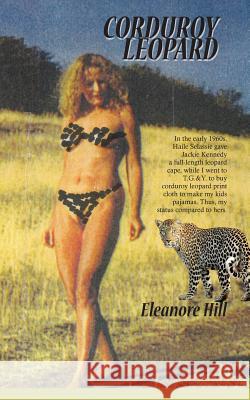Corduroy Leopard » książka
Corduroy Leopard
ISBN-13: 9780997049503 / Angielski / Miękka / 2016 / 130 str.
We Were the Divorcing Generation These short retro glimpses were written between 1962 to 1982, the twenty years when women got old. They went into marriage, had babies, served a "master" in the way of a husband whom they tried to please. The home became a beautiful trap ultimately. We married in our early twenties, went into it as butter ies, and came out as caterpillars twenty years later. We were the divorcing generation.... These short retro glimpses were written between 1962 to 1982, the twenty years when women got old. They went into marriage, had babies, served a "master" in the way of a hus- band whom they tried to please. The home became a beautiful trap ultimately. We married in our early twenties, went into it as butter ies, and came out as caterpillars twenty years later. We were the divorcing generation. Went into what society expected young women between the ages of 18 to 21, to do. If you didn't marry, you became an "old maid." Movies like A Streetcar Named Desire, showed Vivien Leigh already "over the hill" in her thir- ties with the likes of Marlon Brando, in his twenties, rubbing her nose in it. Just watch any of the old sepia-colored movies. Women did not go sit at sidewalk cafes and sip co ee. There weren't any back then; and a woman's place was in the home doing her housework and tending the children. We were still close to a Biblical foundation that taught paying attention to 9 the skin was a sin, in a sense. Of course, if you look at your mother's and grandmothers' old black- and-white photos taken with a Brownie box camera, you see that they grew old as they were suppose to, once "the bloom of youth" wore o and "let nature take its course." Anyone other than professional models, movie stars or professional sex workers, had no excuse to keep looking "beautiful." Chemicals in makeup back then was a jar of Ponds face cream, or any homemade concoction made from goose grease and lye, or rose petals soaked in water, clay packs, beef steaks, chilled tea bags and the original astringent, besides splashing cold water in your face, Witch Hazel. So, the average woman was not much more than a plain-faced nun. Dolling up and going out was a rare thing for the middle class woman of those times. Most had never entered a bar, smoked a cigarette, or even drank anything but lemonade. These stories depict the fear and ever vigilant eye of such a woman, as she sees her rst crowsfoot at the corner of her eye in her late twenties, entering her thirties, tending her children and husband, who, in this case is a hard-to-please critic. As she steams up over laundry, the stove cooking dinner, her lipstick crawls up the lines forming in her upper lip, like mercury in a thermometer, she looks in the mirror and truly believes it's all over for her, being "young." Today, of course, there are no age clothes where toddlers are dressed like dolls and old women have to wear old woman clothes. The times have put grand- mothers and grandkids in the same sweats and tennis shoes. Eleanor Roosevelt died at 77, looking 100 years old. Jane Fonda, at 77, looks 16, if you don't get too close. Dyeing your hair, get- ting a nip and a tuck, liposuction, llers and extractions, are all okay. Between 1960 and 1980, women would have been consid- ered vain, which was looked upon as fear of growing old. You were suppose to get glasses, a gut, loose apping upper arms, false teeth, and wrinkles. Wrinkles It was enough to scare you into obedience, so you wouldn't end up "out there" without the means to wash your face and roll your hair. Look at the boy and 10 girl twins, the Brinkleys: Christy still looks like she did as a teen model. Her twin brother looks like someone's grandpa. Times have changed; but these stories show the astute eye of a house- wife who looked for signs of aging, almost obsessively, however educated and accomplished she was and would become in her later life. She is in her 20's and 30's in these pieces.











